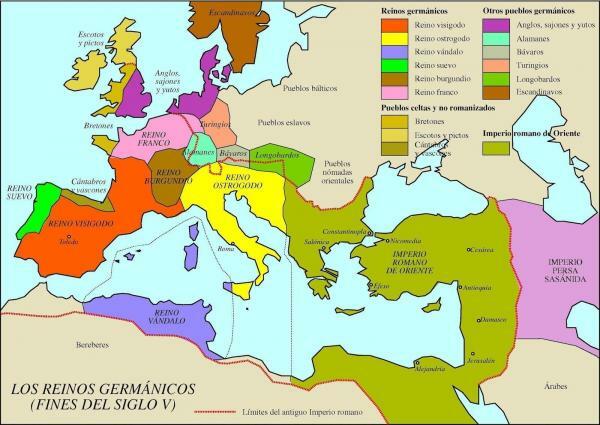Consequences of the barbarian invasions

The fall of the Western Roman Empire it brought as a consequence for Europe a period of political, social and economic instability that would end up creating a new social order, which would become known in the Middle Ages. In this lesson from a TEACHER we will talk about the consequences of barbarian invasions, which were carried out by a series of tribes outside the Roman limex and that since the 3rd century were wearing down the power of the Empire. In this way we will know the rupture that occurred, the acculturations that may have occurred and, on the other hand, the emergence of a new form of government.
Index
- The end of the Roman Empire
- Aftermath of Barbarian Invasions: Change of Power
- Appearance of new languages, another important consequence
- Disarticulation of trade, another consequence
The end of the Roman Empire.
Before talking about the consequences of the barbarian invasions, we will stop to know the beginning of this story, which begins with the fall of the Roman Empire. In 476 the last Roman emperor was deposed,
Romulus Augustus at the hands of Odoacer, the king of Heruli. But, long ago, there had been the famous and intriguing Barbarian Invasions.From the 2nd century on we will find signs of the passage of the barbarian population in a peaceful way into the Roman territory, these populations passed to seek an improvement in the quality of life, in addition to looking for more protected places from other quite bellicose tribes that were moving from their places of source.
In principle, these populations settled, paid their taxes to the State and also went on to form part of the Roman army, for which Rome did not have any kind of problem, because they were also good Warriors. The inconvenience began when some of these populations obtained sufficient powers because in this way they put pressure on the Senate so that what they wanted would be done, and if the Senate did not accept their requests, everything could be in danger by breaking out a war internal.
Thus we will find that from the S III in the Empire they happened in a quite accelerated a series of emperorsTherefore, the effective control of the Empire was almost nil since there were not many emperors strong enough to stay in power long.
In the same way, from the year 350 we will find the mass entry of a series of populations that were settling in different parts of the Empire creating a series of kingdoms, some for a time were allies of Rome, such as the Visigoths or the Franks and in other cases enemies such as the Suevi or the Alanos.
In this other lesson we stop at the causes of the fall of the Roman Empire.

Image: 2nd ESO IS blog
Consequences of the barbarian invasions: Change of power.
Continuing with our lesson on consequences of barbarian invasions we will stop to explain now the change of power that this brought. Until the deposition of the last Roman emperor, we will find a certain political unity (in theory) by the which there was a head of state, the emperor, and a great mass of officials who conducted the affairs of the Empire.
We have to say that this was in theory because from the end of the S II we will find that the administration of the Empire was getting worse, especially due to the great economic crisis that lived this, which produced that many peasants began to ask for the protection of the patricians to whom they sold their lands although they continued to work them as a usufruct.
It is here that we can see the germ of what would later be known as the sfeudo-vassal system. This fact made the administration unable to collect enough, something that affected the payment of the soldiers at the border who began to stop doing their jobs.
This whiting that bites its tail, was what caused that last year 350 the barbarian tribes will begin to enter without any problem in the Empire, since the Imperial troops made no effort to stop them.
All of this made after the barbarian invasions there was a change of power, in which we will find:
- Creating different Germanic kingdoms, for which we will find a mosaic of monarchies scattered throughout what was previously the Empire.
- The appearance of what would later be the system fiefdom-vassal, that is, the landowners began to have a lot of power and many lands and it would be these who would choose the kings of the different monarchies. Many of these over time would have the noble positions such as count or duke among others.
In this other lesson we will discover the Germanic kingdoms in the Middle Ages.

Image: Historical Atlas - blogger
Appearance of new languages, another important consequence.
With the end of the Empire, Latin was relegated to the Church, which continued to use it (to this day) and with it also the knowledge of all classical time was linked to the monasteries, which cared to keep them and preserve them until a new moment, which would be the Full Age Half.
Therefore, just as we will find a mosaic of kingdoms, we will see a mosaic of different languages and within these some dialects or variants. These would be known as Romance languages that from the Full Middle Ages acquired great importance and we will even find works written in them.
In this way, Latin was relegated to being the universal language to communicate, being therefore the members of the Church the representatives of the different kingdoms, as they were the only ones who knew how to read, write and often speak said language.
Disarticulation of trade, another consequence.
And we end with consequences of barbarian invasions speaking, now, of an aspect more linked to economic issues. As a new social order is established, we will find that trade suffered a certain decline, since the invading tribes had a more antarctic economy, that is, they produced what they needed without the need therefore for the existence of trade, which was relegated to a food trade, where grain was the most demanded and some other objects.
These shops were on a small scale and since the Middle Ages we will find the appearance of fairs. In the same way the maritime trade would also be lost because the Germanic tribes barely had maritime experience, with some of it remaining in northern Europe (where there was always navigation).
One of the definitive elements for the disappearance of trade it was that the cities were almost completely abandoned, remaining only for the headquarters of the dioceses of the old Roman provinces, where the archbishops would install their courts and little else. Well, the world that emerged after this political change was the rural environment.
If you want to read more articles similar to Consequences of the barbarian invasions, we recommend that you enter our category of Story.


![Art NOUVEAU architecture: characteristics and examples [with PHOTOS!]](/f/331f9c4baf470e098e233c7f83565fee.jpg?width=300&height=200)
